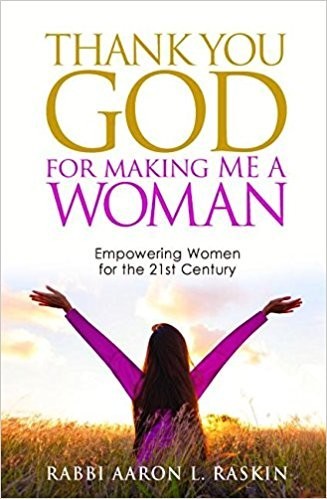Chabad rabbi’s book targets today’s women
Among American Jews in the wide swath extending to the left of Orthodoxy, women have voiced a compendium of grievances about traditional Judaism for generations, and Rabbi Aaron L. Raskin tackles them in his newest book, “Thank You G-d for Making Me a Woman: Empowering Women for the 21st Century.”
It’s intended to soothe those smarting at rabbinic rulings they consider harsh and outdated.
Rabbi Raskin, for 30 years a Chabad emissary in Brooklyn Heights, opens with the story of a female congregant in his synagogue, Congregation B’nai Avraham.
“I really enjoy the services here,” she tells him. “I enjoy the sermons, the spirit and the people. But … I am an intelligent, well-educated, professional woman and I want to know why I can’t participate in the service. Why can’t I be called to the Torah, or be counted in the minyan, or lead the service? I have a nice voice, too. And this mechitza that separates men and women, what’s that all about?
“And the biggest problem I have is the blessing men say [each morning]: ‘Thank you G-d for not making me a woman.’ How do you explain that one?”
Rabbi Raskin goes on to describe additional rules that some women take issue with: According to halacha, women generally may not serve as witnesses, may not wear tefillin and are dependent on their husbands to provide a bill of divorce.
Rabbi Raskin, who tells the reader that he wrote this book with his daughter, wife, mother, grandmother and all of his female relatives in mind, points out many ways that Orthodox Judaism protects, cares for and reveres women and their rights, such as the biblical story of the daughters of Zelofchad, who argued that they should inherit the portion of the promised land that their father would have received had he not died. Moses discusses the case with G-d, who praises the daughters and says they should inherit the land. The book also points to female leaders in the Bible, such as the judge Devorah.
The blessing men say each morning, “Thank you G-d who has not made me a woman,” cannot be offensive, Rabbi Raskin explains, because the Torah views men and women as equally valued, and since the Torah commands us to love our neighbors as ourselves while also forbidding us to embarrass a neighbor, our interpretation of this as insulting is simply a misunderstanding on our part.
As for men and women separating during prayer services, this is merely a reflection of how services were conducted in the Holy Temple in Jerusalem during ancient times, he said.
Ultimately, Raskin argues there is tremendous beauty, good and logic in the practice of Orthodox Judaism, which many women with one foot firmly in the modern world and the other in traditional Jewish observance understand and appreciate.

 61.0°,
Light Rain
61.0°,
Light Rain 




